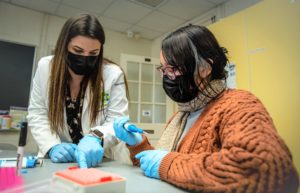To accelerate breakthrough cancer research in the human genome, the Gene Editing Institute at Christiana Care’s Helen F. Graham Cancer Center & Research Institute has entered into an agreement with The Wistar Institute. The agreement expands the historic partnership between the Graham Cancer Center, one of the nation’s largest community cancer centers, and Wistar, the nation’s first National Cancer Institute-designated cancer center dedicated solely to biomedical research.
In this partnership, the Gene Editing Institute will be integrated into Wistar’s Molecular Screening Facility, which will allow its innovative gene-editing technologies to be made available to research projects at Wistar and to external users. The Gene Editing Institute will retain its management structure and will remain located at the Graham Cancer Center on the Christiana Hospital Campus. The Molecular Screening Facility will remain housed at Wistar in Philadelphia.
“Bringing together scientists from the Gene Editing Institute and Wistar promises to be a catalyst that will speed progress in personalized medicine for cancer and other diseases,” said Nicholas J. Petrelli, M.D., the Bank of America endowed medical director of the Helen F. Graham Cancer Center & Research Institute at Christiana Care Health System. “With the addition of the Gene Editing Institute to The Wistar-Graham Cancer Center partnership, we are uniquely poised to advance the goals of Vice President Biden’s National Cancer Moonshot Initiative to accelerate the path to prevention, diagnosis, treatment, and — ultimately — to a cure of cancer.”

“This is another excellent example of Christiana Care’s and Wistar’s commitment to collaboration and enhancing opportunities that will ultimately advance important scientific discoveries to move the field forward,” said Dario C. Altieri, M.D., Wistar president and CEO and director of The Wistar Institute Cancer Center.
Under the direction of molecular biologist and gene-editing pioneer Eric Kmiec, Ph.D., the Gene Editing Institute is unlocking the genetic mechanisms that drive cancer, potentially leading to revolutionary new therapies and treatments. Through funding from the National Institutes of Health, the American Cancer Society and private foundations, the Gene Editing Institute utilizes the next generation of precision genetic tools, including CRISPRs and TALENs, which manipulate and control genetic material.
In a breakthrough discovery, researchers at the Gene Editing Institute found that combining CRISPRs and single-stranded DNA oligodeoxynucleotides – short strands of synthetic DNA – greatly enhances precision and reliability in editing the human genome. With this combination, researchers are better able to identify and develop innovative therapies to revolutionize cancer treatment.
“Gene editing is rapidly becoming one of the most dominant and impactful techniques in biomedical research today,” said Dr. Kmiec. “The Gene Editing Institute provides an important core function and expertise in collaborative work with scientists at The Wistar Institute, who continue to maintain state-of-the-art research programs in cancer. Combining our research groups creates a powerful and innovative team with complementary biomedical skill sets that will accelerate the discovery of novel, therapeutic regimens in the treatment of many types of cancer.”
The two organizations have already begun scientific collaborations involving research on melanoma and lung cancer.

The Wistar Institute Molecular Screening Facility is a shared resource accessible to Wistar and non-Wistar scientists. The facility enables investigators to apply cutting-edge technology and unique resources to discover molecular, genetic and small molecule compounds suitable to further study the functions of poorly understood proteins, signaling pathways and cells in complex biological processes relevant to human physiology and disease. It fosters collaborations and fulfills the long-term translational goal of The Wistar Institute Cancer Center of merging basic mechanisms of cancer biology with disease-relevant themes of early-phase drug discovery and new target identification.
This latest agreement enhances the bold research partnership between the Graham Cancer Center, an NCI Community Oncology Research Program (NCORP) and one of the first NCI-selected community cancer centers, and The Wistar Institute, the nation’s first NCI-designated research center solely devoted to cancer biology research. The NCI has called the historic partnership “extraordinary and innovative.”
The partnership, established in 2011, is the first-ever inter-institutional affiliation between an NCI-designated basic research institution and a community cancer center. This pairing has created unique opportunities for collaboration in cancer research, bringing together for the first time basic and translational investigators with dedicated community oncologists. Together, Graham Cancer Center clinicians and scientists at Wistar are collaborating on research projects targeting ovarian cancer, breast cancer and more, in addition to studies on lung cancer and melanoma.



